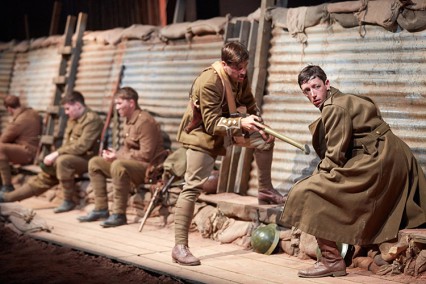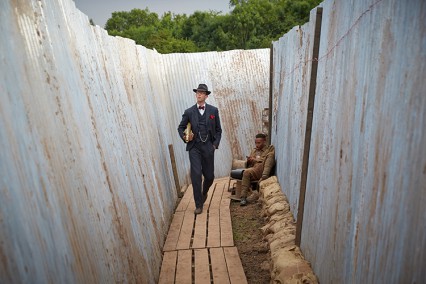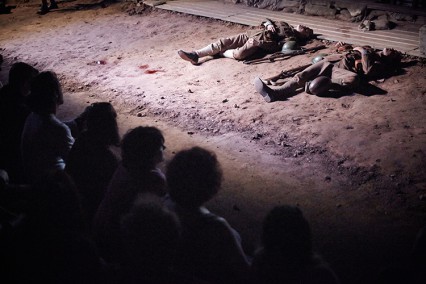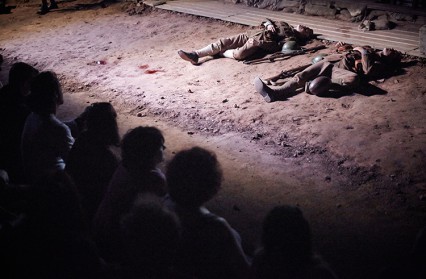Mametz is a National Theatre Wales play written by Owen Sheers and directed by Matthew Dunster that explores the 1916 battle of Mametz Wood.

On a silent overcast evening, a single soldier stands in the pale green grass of the waving hills of Mametz Wood. From the distance another approaches a runner, one hand holding on firm his Tommy’s tin helmet, the other holding firm a note. It is delivered with a salute, the arm bending angular against the deep blue of the horizon, and the runner is off again, off and away over the sightline back into history, back into the whispers of the landscape. Thus begins Mametz.
There have been times in the last three years when it has seemed like the forces pushing out from the core of National Theatre Wales might have been happier in the theme park business than the theatre business. There have been times when this has really worked and times when it has been less successful: sometimes you can even feel, as an audience member, as an intruder to a product rather than a guest. In the case of their 2014 centrepiece, a show-stopping commemoration of the fallen at the battle of Mametz Wood in 1916, they have created a sprawling, admirably over-ambitious experience, that has many faults, but ultimately is a sincere and moving monument to sacrifice.
Based in and around an ‘ancient woodland near Usk’ (theatre) the audience is ushered through a series of diorama designed to move each member from the comforts of modern life through the decades back to the craggy sepia of the Great War (theme park). The first point of interest is that this is true ‘a theme park’ framing (‘Cook’s Tours’ to be precise) for the production (although one that does not really last). All attempts to contextualise and immerse via the tried and tested the power of dramatic writing is eschewed for a straightforward historical presentation, complete with blackboard, professor and pointer stick. It gets some scene-setting out of the way, but it also prepares the audience for an evening of being talked at. And there are moments when this is powerful and moments when it is not. But Mametz is a production full of discombobulating contrasts and challenges.
In a long and sometimes chaotic, over-full presentation of strife and grief, director Matthew Dunster melds the script of Owen Sheers (by whose poem, ‘Mametz Wood’, this production was inspired) with words from poets who were there, such as David Jones and Llewelyn Wyn Griffith, and more esteemed war poets, Gurney, Sassoon and Graves. Owen Sheers’ script, though hitting many of the right notes and clearly well-crafted, lacks the real fizz of great work. He may have got away with it, too, had his words not been spoken beside the rich intestinal musings of one of Wales’ great poets, David Jones. It is not Sheers’ fault that, next to the emollient passion of Jones’ richness, the other monologues feel a bit ‘BBC middle-brow’; very few writers’ works could stand next to Jones and seem anything other. But it does mean that, while other characters are delivering their tragic soliloquies, Jones waits in the shadows with his; as heavy, domineering and distracting as Death himself. Jones is one poet who immediately comes to mind when you think of all those forgotten in the demulsifying fog of Dylan Thomas’ centenary celebrations. It is all credit to NTW for shining a light on one of Wales’ most important, profound and rewarding artists.

Jones is brought to life in what is one of the finest theatrical performances a Welsh stage will see this year. Rhys Isaac-Jones matches perfectly the precocious intellectualism of the 19-year-old Jones, a Londoner obsessed with his Welsh heritage, with a gradual realisation of the profundity of the situation. There is something within the performance that grows as the throttling intensity of Jones becomes tighter, and it is the highlight (along with Jones’ own words) of the entire production.
Isaac-Jones is surrounded by strong performances, (although they often come in and out in a way that holds up any sense of pacing the production may have). Michael Elwyn as the older Llewelyn Wyn Griffith, interrupted by his memories on a trip back from Waitrose, is a gaunt and ominous presence. Stephen Casey is excellent in his several roles of authority. Tara D’Arquian floats around the periphery like Athena’s statue, an all-knowing eye (even is she is made to linger to the point of distraction).
When required, the performances do not falter on matters of emotional engagement, although it was in stark contrast to the production’s attempts at intellectual enlightenment. The motif concerning Einstein was an excruciatingly jarring, pace-clogging novelistic attempt at intellectual weight, and only served to confuse matters and render other, more subtle attempts as only part of a distraction. The point of the motif seems to be to instruct the audience that war and suffering are not locked into the past, a point that barely needs making, never mind labouring to the extent that it is here. Perhaps they were thinking of Orwell’s ‘one-eyed pacifism peculiar to sheltered countries with strong navies’ when they thought of the audience in rehearsal. The lingering ghosts of Mametz Wood would have haunted to greater effect in the absence of Quantum Physics.
Another discomfiting contrast was in the imbalance between actors addressing the audience and actors engaging in dialogue. There was a period in the centre where the most affecting bombardment was not the simulated artillery shells popping overhead, but the monotonous rolling thunder of deathless monologues. In isolation, these proposed snippets from the souls of those in the midst of these extraordinary circumstances may have proved bayonet sharp, but they were left disappointingly blunt in numbers. The continual procession of monologues drudged coldly on, as amidst them the moments when the cast was actually allowed to interact fizzed and popped. It is very doubtful that screaming ‘show don’t tell’ at the stage would have done much good; NTW is a company that wears its convictions with head high. But the fact is that the suspicion that the power of Mametz lies in the assimilated suffering of those at the root of the story and not in the craft of the production at all is a very real one.

There were many other frustrating dichotomies: wonderful performances stunted by moments of overwrought cliché (not one soldier writing to his family back home, but five); powerful images paired with clumpy writing; subtle and thoughtful points followed up with mortar shell (is it more tragic that some of those who died had been capped by Wales?). A significant problem with Mametz is that it tries to do too much. There are too many stories to tell, too many tragedies to explore, too many angles from which to approach the story. The fact that NTW has, it seems, decided to tell all the stories, cover all the angles, makes for both an overwhelming experience, but also one that feels like a bit of a missed opportunity. (Band of Brothers went for this approach, but had thirteen hours in which to do so.)
It all comes to a head in the woods, rain cutting across the silent want of the canvas greenery, images of the slain hanging from trees like melting clocks, soldiers in series’ of animatronic death throes. The finale is horrifying, emotive, tragically beautiful, and covers many a frustrated sin that comes before as well as enhancing the powerfulness of Mametz’s successful moments. That Mametz is over-complicated and perhaps in need of a touch of humility is perhaps beside the point. Perhaps it was dragged out a little (what a cutting of Einstein could have done for the play!), but what Mametz does, and does to great effect, is make you think about the experience and the sacrifice of the people of the Great War. And perhaps that Mametz does not fulfil all of its ambitions is not a matter for poring over either; that it is sincere, that it is moving, is all that really matters. And to that extent, Mametz is a homage of which NTW, and Wales, can be proud.
Tickets for Mametz which explores the 1916 battle of Mametz Wood by Owen Sheers & Matthew Dunster are available now.
Gary Raymond is an editor and regular contributor at Wales Arts Review.
For other articles included in this collection, go here.
For more Wales Arts Review coverage of National Theatre Wales, including news, reviews, and interviews, click here.



 Enjoyed this article? Support our writers directly by buying them a coffee and clicking this link.
Enjoyed this article? Support our writers directly by buying them a coffee and clicking this link.








